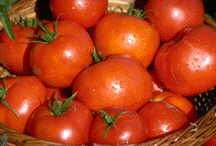|
|
TOMATOES
THE BEST SOURCE OF LYCOPENE

Lycopene,
an natural antioxidant found in a number of fruits and vegetables,
seems
to surpass beta-carotene and vitamin E in its ability to fight free
radicals.
Free radicals can cause oxidative damage, which seems to underline both
cell mutation and arterial plaque.
Recent studies indicate that
Lycopene,
the red pigment of the tomato, as well as watermelon, guava, papaya and
grapefruit which is a powerful caroteniod, seems to be one of the most
potent antioxidants that works also for prostate cancer prevention and
prevention of cardiovascular disease. There is mounting evidence that
caroteniods
prevent damage to DNA and help keep cancer from forming.
Lycopene
is considered one of the more effective antioxidants because it is not
converted to vitamin A when ingested, and conversion to vitamin A
weakens
the antioxidant properties of carotenoids like beta carotene.
While tomatoes
are the best source of lycopene, many studies have suggested that
tomato
products such as tomato sauce, ketchup, tomato paste and coctail sauce
seem to contain a much higher concentration of the chemical. Processing
and cooking, because of the high temperatures involved, release
lycopene
from its food matrix and make it more easily absorbed by the body.
Researchers
have also found that a little bit of fat, such as oil, with tomato
products
enhances the body's absorption.
|
FOOD SOURCES
OF LYCOPENE
|
|
Food
Item
|
Lycopene
in milligrams
|
| Tomato
Soup, 1 cup |
24.8
mg
|
| Tomato
or Spaghetti Sauce, ½ cup |
19.4
mg
|
| Canned
Tomatoes, ½ cup |
11.8
mg
|
| Watermelon,
1 cup |
7.8
mg
|
| Ketchup,
2 tablespoons |
5.1
mg
|
| Fresh
Tomato, 1 medium |
3.7
mg
|
| Pink
or Red Grapefruit, ½ cup |
1.8
mg
|
|
Source: USDA/NCC
Carotenoid Database for U.S. Foods -- 1998 & Tomato Research Council
|
To
salute your good health, we are pleased to offer these creative recipes
that will
help you reap the benefits of this groundbreaking research. Including
tomatoes in your daily diet is a delicious and effective way to please
your palate - and may also help fight some types of cancer. So, indulge
in the mighty tomato!
Browse Recipes:
|
|
Lycopene
|
Lycopenes
are part of the family of pigments called carotenoids, which are
natural
compounds that create the colors of fruits and vegetables. Research
shows
that lycopenes are the most powerful antioxidant in the carotenoid
family.
Like essential amino acids, they are not made in the human body.
Antioxidants,
which includes vitamin C and E, are important in protecting the body
from
free radicals which degrade many parts of the body.
Lycopene
can also be taken in the form of soft-gel capsule supplements.
Dosages
may vary according to manufacturer.
Lycopene obtained from eating fruits
and vegetables has no known side effects and is thought to be safe for
humans.
The potential side effects of lycopene supplements are not yet
known.
|

|
BETA-CAROTENE
(the plant precursor to vitamin A) is a well-known infection fighter
that
protects the mucous membranes of the mouth, throat, nose and sinuses.
It's
abundant in the dark green and vibrant orange vegetables that
make
great winter soups, salads and casseroles: broccoli, squash, pumpkin,
spinach,
sweet potatoes, kale, and escarole.
|
|
|